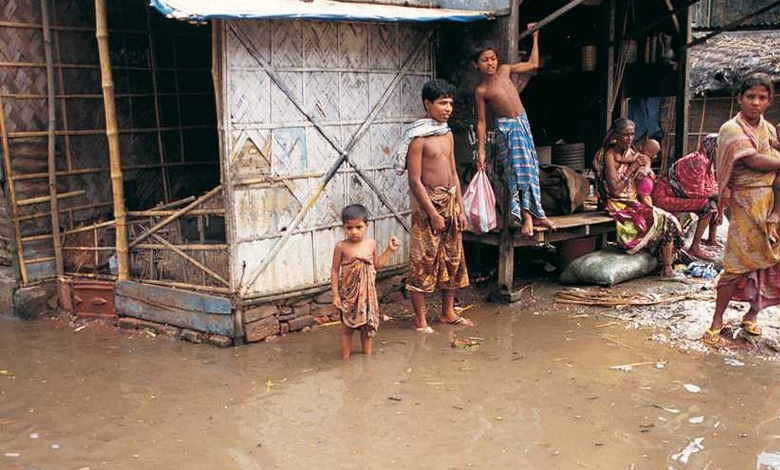Climate Change Fuels Modern Slavery in Bangladesh

In the vast and diverse landscape of climate change‘s impact on human lives, a disturbing intersection unfolds in the coastal regions of Bangladesh. Here, where the consequences of climate change and modern slavery collide, stories of resilience and despair paint a complex picture of survival.
A Cycle of Climate-Induced Hardship
One such story is that of the Goldar family, who endured the wrath of Super Cyclone Aila when it struck Bangladesh in May 2009. The cyclone claimed the lives of about 500 people and left countless others struggling to cope with the long-term economic and environmental effects. The Goldar family survived the storm but found themselves trapped in a cycle of climate-induced hardship.
After losing their home, they moved into a one-room shelter provided by the Bangladesh Rehabilitation Assistance Committee (BRAC), a non-governmental development organization. Alam Goldar, the family’s patriarch, sought work in a local brick kiln and turned to fishing in the nearby river. Meanwhile, Rekha Rani, his wife, worked as a day laborer on agricultural land and joined her husband in fishing. Their lives were deeply intertwined with the land and waterways that had sustained their community for generations.
However, climate change had different plans for this region. Rising sea levels, exacerbated by climate change, increased the risk of land loss and contaminated the water supply with salinity. Simultaneously, the changing climate disrupted marine habitats, such as mangroves, river estuaries, and coral reefs. These ecosystems were crucial to the livelihoods of coastal communities, where 47 percent of households relied on fishing and harvesting invertebrates for both sustenance and income.
The adverse impact of climate change on agriculture rendered the land unproductive and pushed many families into the clutches of high-interest moneylenders. Families in these coastal areas began to experience the grip of what could only be described as modern slavery. Interest rates soared, at times reaching a staggering 15 percent per month, ensnaring these families in a never-ending debt cycle.
Families, like the Goldars, pledged their labor in exchange for the loans. In many cases, they worked tirelessly in the brick kilns, where they toiled for as long as the owner demanded, often exceeding the legal limits of an eight-hour workday. The combination of backbreaking labor and exorbitant interest rates effectively made them modern-day slaves.
Suman Malaker, a program officer for Caritas Bangladesh, the social service arm of the nation’s Catholic bishops’ conference, characterized this dire situation as “modern slavery.” The reality was bleak, as climate change-induced economic hardships pushed families into this harrowing predicament.
A Path Towards Empowerment
Fortunately, organizations like Caritas Bangladesh are not standing idly by. With support from the Catholic Agency for Overseas Development (CAFOD), they are working tirelessly to assist the 450 families at risk of human trafficking and forced migration. Their multifaceted approach involves providing financial support and training to empower these families, offering them the chance to increase their income and reduce their dependence on exploitative moneylenders.
In Rekha Rani’s case, her life took a different turn. She used the assistance from Caritas to open a small store. The store, although modestly built, signified a beacon of hope in her life. This allowed her to become more self-reliant and less dependent on the merciless cycle of modern slavery.
A Wider Issue
The Goldar family’s story is not unique. In the Shyamnagar sub-district, home to over 100,000 families, at least 10,000 of these families fall victim to the modern slavery trap. These numbers are staggering, and the crisis calls for an urgent, comprehensive response.
Climate change-induced hardships, coupled with the lack of job opportunities in the coastal region for nearly half of the year, perpetuate the vicious cycle of debt and exploitation. In a world already grappling with the severe consequences of climate change, the human rights and dignity of the most vulnerable must be protected.
This situation also highlights the pressing need for climate justice. Bangladesh, home to approximately 17.33 million people, is one of the world’s most densely populated nations. The low-lying coastal areas of the country, such as Satkhira, are especially vulnerable to flooding and other climate-related disasters due to its geography. Cyclones, floods, and agricultural land contamination are a harsh reality for these communities.
Read More: Climate Commitments: The Challenge of Net-Zero Goals
The impact of climate change is a global issue, and the responsibility for climate justice falls upon us all. Delaying urgent climate action only exacerbates the suffering of communities like those in southern Bangladesh. Climate-induced disasters have cost families in these regions an average of 462,000 Bangladeshi taka (approximately $4,211) in lost income over the past two decades. They deserve not only assistance but also justice and long-term action.
The Resilience of the Human Spirit
Despite the daunting challenges posed by climate change and modern slavery, stories of resilience and determination continue to emerge. People like Rekha Rani and the Goldar family have shown that the human spirit is indomitable, even in the face of overwhelming odds.
Rekha Rani’s journey to self-reliance through her small store symbolizes the hope that we can break the chains of modern slavery fueled by climate change. Her ambition to create a better future for her children embodies the strength and courage of those battling these complex challenges.
But this is just the beginning. Caritas Bangladesh’s efforts, while commendable, are not enough to transform the situation across the entire region. Comprehensive, long-term strategies and increased funding are necessary to create sustainable livelihoods, provide legal aid, and ensure that the most vulnerable communities can rebuild their lives.
As the impact of climate change continues to reverberate worldwide, we must commit to protecting the rights and dignity of those affected. Climate justice is not an option; it is an imperative. The resilience of individuals like the Goldar family reminds us of the strength of the human spirit. It is our collective responsibility to ensure that no one is left behind in the struggle against climate change and modern slavery.



